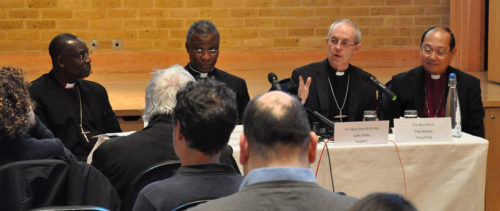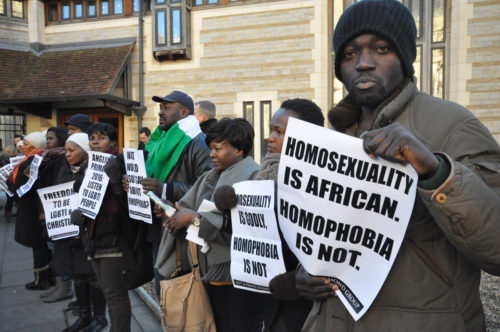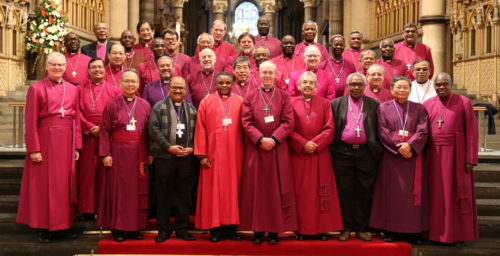Welby apologizes for persecution on the grounds of sexualityAnglican Primates Meeting concludes with commitment to walk togetherPosted Jan 15, 2016 |
|

Archbishop of Canterbury Justin Welby makes a point Jan. 15 during a press conference held after the five-day Anglican Primates Meeting at Canterbury Cathedral in England. Photo: Matthew Davies/Episcopal News Service
[Episcopal News Service – Canterbury, England] Archbishop of Canterbury Justin Welby apologized Jan. 15 to lesbian, gay, bisexual and transgender people for the hurt and pain they have experienced by the Anglican Communion over the years.
Speaking at a press conference following a five-day meeting of Anglican primates in Canterbury, Welby referred to a group of some 40 gay and lesbian Africans who had gathered outside Canterbury Cathedral to protest the actions of the primates in calling for the exclusion of the Episcopal Church from Anglican dialogues and committees.
The protestors, many of whom spoke with the media about the persecution they have faced, challenged the so-called “consequences” asked for by the primates as homophobic because they were a direct response to the decision by the Episcopal Church’s General Convention last July to change canonical language that defines marriage as being between a man and a woman (Resolution A036). That convention also authorized two new marriage rites with language allowing them to be used by same-sex or opposite-sex couples (Resolution A054).
“The group outside … reminds us of the pain and suffering of many LGBTI people around the world and the extreme suffering in some countries where they are criminalized,” Welby told the media. “It is for me a constant source of deep sadness that people are persecuted for their sexuality … I want to take this opportunity personally to say how sorry I am for the hurt and pain in the past and present that the church has caused.”
Welby’s words may provide some comfort to those who are marginalized because of their sexuality. Meanwhile, some African provinces continue to support the criminalization of homosexuals in countries such as Nigeria and Uganda.
On two occasions, in response to media questions, Archbishop Josiah Idowu-Fearon, secretary general of the Anglican Communion, talked of the frustration in some African provinces of Western cultural understandings of sexuality being “imposed” on their communities.
“There are gays and lesbians in Africa, of course there are and we have always had them,” said Idowu-Fearon. “But generally on the continent of Africa our culture does not support the promotion of this type of lifestyle … If the Western world would just leave Africans within our various cultures, we know how to live together with our various differences … The primates have made it very clear that we have always made room for pastoral care and concern for those who have different sexual orientation. When we begin to make everybody, irrespective of their sexual orientation, feel a part of the family we will have some respite.”
In their communiqué, titled “Walking Together in the Service of God in the World,” the primates said they condemn “homophobic prejudice and violence and resolved to work together to offer pastoral care and loving service irrespective of sexual orientation. This conviction arises out of our discipleship of Jesus Christ.
“The Primates reaffirmed their rejection of criminal sanctions against same-sex attracted people.”
They also said that the Christian church and the Anglican Communion have “caused deep hurt” by the way they have treated people based on their sexual orientation. The primates said they “express their profound sorrow and affirm again that God’s love for every human being is the same, regardless of their sexuality, and that the church should never by its actions give any other impression.”
The primates said in their communiqué that their first item of business during their Jan. 11-15 gathering was to discuss “the differences among us in regard to our teaching on matters of human sexuality.”

A group of some 40 gay and lesbian Africans gathers outside Canterbury Cathedral Jan. 15 to protest the actions of the Anglican Communion primates in calling for the exclusion of the Episcopal Church from Anglican dialogues and committees. Photo: Matthew Davies/Episcopal News Service
They said they had to look at what it meant “in practical terms” to live out their desire ‘to walk together, however painful this is, and despite our differences, as a deep expression of our unity in the body of Christ.” The communiqué said a working group of primates developed the series of actions imposed on the Episcopal Church as a consequence of its actions at General Convention.
On Jan. 14, a majority of the primates said that the Episcopal Church, for a period of three years, should “no longer represent us on ecumenical and interfaith bodies, should not be appointed or elected to an internal standing committee, and that while participating in the internal bodies of the Anglican Communion, they will not take part in decision making on any issues pertaining to doctrine or polity.”
While some participants and some observers are referring to the primates’ request as “sanctions,” the communiqué calls them “consequences” for the actions of the Episcopal Church. At the post-meeting news conference Welby insisted on the consequences terminology.
Presiding Bishop Michael Curry said Jan. 15 in a video statement recorded outside Canterbury Cathedral that “this has been a disappointing time for many, and there will be heartache and pain for many, but it’s important to remember that we are still part of the Anglican Communion.
“We are the Episcopal Church, and we are part of the Jesus Movement, and that movement goes on, and our work goes on. And the truth is, it may be part of our vocation to help the Communion and to help many others to grow in a direction where we can realize and live the love that God has for all of us, and we can one day be a church and a Communion where all of God’s children are fully welcomed, where this is truly a house of prayer for all people.”
The Rev. Gay Clark Jennings, president of the Episcopal Church’s House of Deputies, sent a letter Jan. 15 to deputies and alternate deputies concerning the actions taken by the Primates Meeting to impose consequences on the church for its actions on same-sex marriage.
Many of the Episcopal Church’s bishops have written to their dioceses about the primates’ action. Episcopal News Service has collected those statements, as they are made available, here.
The primates also asked Welby to appoint a task group “to maintain conversation among ourselves with the intention of restoration of relationship, the rebuilding of mutual trust, healing the legacy of hurt, recognizing the extent of our commonality, and exploring our deep differences, ensuring they are held between us in the love and grace of Christ.”
In their communiqué, they said they will “develop this process so that it can also be applied when any unilateral decisions on matters of doctrine and polity are taken that threaten our unity.”
Archbishop Foley Beach, the leader of the Anglican Church in North America (ACNA), met with the primates throughout the week. Beach was invited by Welby in an effort to avert a boycott from conservative African archbishops such as the one that occurred at the last Primates Meeting in 2011. ACNA is composed largely of former Episcopalians who chose to break away from the Episcopal Church. Some African primates have declared their affiliation to ACNA.
Foley told ACNA members that the consequences imposed on the Episcopal Church “are strong, but they are not strong enough.” He said he was “deeply disappointed” that the Anglican Church of Canada had not had the same consequences imposed on it as those set the Episcopal Church. The Anglican Church of Canada allows its clergy to bless same-sex couples and is considering changes to its canons that would allow for same-sex marriage.
He told ACNA that he “participated fully in the meeting.” There have been reports that Foley was given both voice and vote in the meeting, and declined to vote on imposing consequences on the Episcopal Church.
The primates said in their communiqué that they cannot recognize ACNA as a member of the communion because that decision properly belongs to the Anglican Consultative Council. The primates said they “recognize that such an application, were it to come forward, would raise significant questions of polity and jurisdiction.”
The ACC has detailed the steps necessary for the amendments of existing provincial constitutions and the creation of new provinces. In 1996, it set its most extensive description of the process in Resolution 12 passed at its meeting in Panama City, Panama.
The ACC is already scheduled to meet April 8-20 in Lusaka, Zambia.
Also in the communiqué, the primates said they:
* supported Welby’s proposal to call a Lambeth Conference gathering of all of the communion’s bishops, in 2020. The last meeting was in 2008 and the conference has traditionally happened every 10 years. However, Welby had already said the bishops would not meet in 2018.
* agreed to meet again in 2017 and 2019.
* heard about a petition of almost two million signatures co-coordinated by the Anglican Environment Network, reports about moves to divest from fossil fuels, the expansion of deserts in Africa and “the struggle for survival of the peoples of the Pacific as island life is threatened in many places by the rise of sea levels.”
* “discussed the reality of religiously motivated violence and its impact on people and communities throughout the world. Primates living in places where such violence is a daily reality spoke movingly and passionately about their circumstances and the effect on their members.”
* “repudiated any religiously motivated violence and expressed solidarity with all who suffer from this evil in the world today.”
* said they look forward to a proposal coming to the ACC for “comprehensive child protection measures to be available throughout all the churches of the Communion.”
* were “energized by the opportunity to share experiences of evangelism and motivated to evangelize with their people,” and said they “joyfully commit themselves and the Anglican Church, to proclaim throughout the world the person and work of Jesus Christ, unceasingly and authentically, inviting all to embrace the beauty and joy of the Gospel.”
* discussed what they called “tribalism, ethnicity, nationalism and patronage networks, and the deep evil of corruption” and “reflected that these issues become inextricably connected to war and violence, and derive from poverty.” They agreed to ask the secretary general of the Anglican Communion to commission a study for the next Primates Meeting.
Who are the primates?
Primates are the senior archbishops and presiding bishops elected or appointed to lead each of the 38 autonomous provinces of the Anglican Communion. They are invited to the Primates Meetings by the Archbishop of Canterbury to consult on theological, social and international issues.
The Anglican Communion Primates Meeting is one of the three instruments of communion, the other two being the Lambeth Conference of bishops and the Anglican Consultative Council, the Communion’s main policy-making body. The Archbishop of Canterbury, as primus inter pares, or “first among equals,” is recognized as the focus of unity for the Anglican Communion.
Each province relates to other provinces within the Anglican Communion by being in full communion with the See of Canterbury. The Archbishop of Canterbury calls the Lambeth Conference, chairs the meeting of primates and is president of the ACC.
In some Anglican provinces the primate is called archbishop and/or metropolitan, while in others the term presiding bishop – or as in Scotland, primus – is used.
The Archbishop of Canterbury also invites to the primates’ meetings the moderators who lead the united ecumenical churches of North India, South India and Pakistan.
In 1978 Archbishop Donald Coggan, the 101st Archbishop of Canterbury, established the Primates Meeting as an opportunity for “leisurely thought, prayer and deep consultation.”
The primates have met in Ely, England, in 1979; Washington, D.C., in 1981; Limuru, Kenya, in 1983; Toronto, Canada, in 1986; Cyprus in 1989; Newcastle, Northern Ireland, in 1991; Cape Town, South Africa, in 1993; Windsor, England, in 1995; Jerusalem in 1997; Oporto, Portugal, in 2000; Kanuga Conference Center, Hendersonville, North Carolina, in 2001; Canterbury, England, in 2002; Gramodo, Brazil, in May 2003; London, England, in October 2003; Newry, Northern Ireland, in February 2005; Dar es Salaam, Tanzania, in February 2007; Alexandria, Egypt, in February 2009; and Dublin, Ireland, in January 2011.
The provinces and primates of the Anglican Communion are listed here.
— Matthew Davies and the Rev. Mary Frances Schjonberg are editors/reporters of the Episcopal News Service.


Social Menu